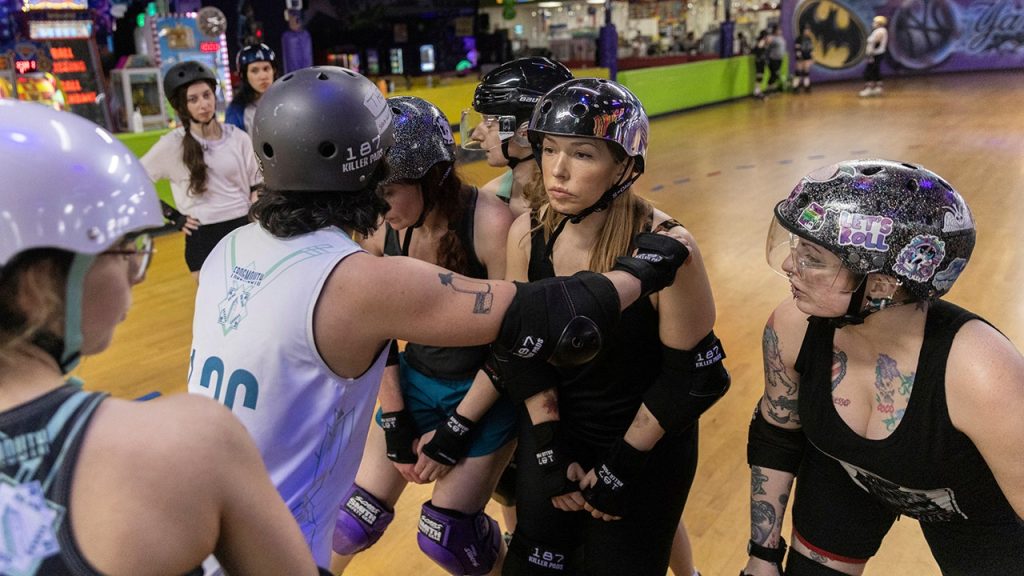A Long Island roller derby league is suing a county leader over an executive order preventing women’s and girls’ teams with transgender players from using county-run parks and fields. The Long Island Roller Rebels, an inclusive league, are fighting back against the order, supported by the New York Civil Liberties Union. The league’s vice president, Amanda Urena, emphasized the importance of creating a safe and welcoming space for all players, including trans women. The lawsuit comes after Nassau County Executive Bruce Blakeman’s order required disclosure of transgender players on teams seeking permits to use county-owned rinks. The Roller Rebels expect to be denied permits, despite their policy allowing anyone who identifies as a woman to participate.
State Attorney General Letitia James has called for the order to be rescinded, citing violations of anti-discrimination laws, while Blakeman has requested a federal judge to uphold the order. Roller derby has historically been an inclusive sport, providing a safe haven for queer and trans women. Margot Atwell, a roller derby player in New York City, highlighted the sport’s welcoming environment for individuals of all gender identities. Blakeman’s rationale for the order is tied to ensuring fair competition for female athletes, a sentiment endorsed by Caitlyn Jenner at a news conference. This issue surrounding trans women in women’s sports adds to the ongoing national discussion on gender inclusion and fairness in sports.
The Roller Rebels, known for their commitment to inclusivity and diversity, are facing barriers in their upcoming season due to the county’s executive order. Despite the league’s efforts to create an open and accepting environment for all players, the order restricts access to county-owned facilities for teams with transgender players. Urena, also known as “Curly Fry,” emphasized the importance of fighting for trans inclusion in sports and maintaining a safe space for trans women to participate in roller derby. The league’s lawsuit, supported by civil rights advocates, challenges the discriminatory nature of the order and seeks to uphold the principles of equality and inclusion in sports.
The controversy surrounding transgender participation in women’s sports has become a heated topic in the current year, with conflicting viewpoints on how to ensure fair competition while also promoting inclusivity. Roller derby, a sport with a long history of embracing diversity, is at the forefront of this debate, navigating the tension between maintaining competitive integrity and supporting gender inclusion. The Roller Rebels’ struggle against the county’s order highlights the challenges faced by marginalized communities in accessing and participating in sports. As the case unfolds, the outcome will have implications for the broader conversation around gender equity and representation in athletics.
The legal battle between the Long Island Roller Rebels and Nassau County reflects a larger societal debate over the rights of transgender individuals in sports. The league’s lawsuit, backed by the New York Civil Liberties Union, challenges the discriminatory implications of the county’s executive order, which restricts transgender women from participating in women’s and girls’ teams using county-run facilities. State Attorney General Letitia James has intervened in the case, calling for the order to be revoked to uphold anti-discrimination laws. The issue has drawn national attention, sparking discussions around fairness, inclusion, and diversity in sports. The Roller Rebels, known for their inclusive stance, are taking a stand for trans rights in sports and advocating for a more welcoming and equitable playing field for all athletes.
As the debate over trans inclusion in women’s sports continues to unfold, roller derby emerges as a battleground for principles of equality and fairness. The Roller Rebels’ fight against the discriminatory county order exemplifies the ongoing struggle to create a welcoming and inclusive environment for all athletes, regardless of gender identity. With support from civil rights advocates and legal intervention from state authorities, the league’s lawsuit represents a pivotal moment in the broader movement for transgender rights in sports. As the case progresses, it will shape the future landscape of gender inclusion and diversity in athletics, setting a precedent for how sports organizations and policymakers address issues of discrimination and access for marginalized communities.


